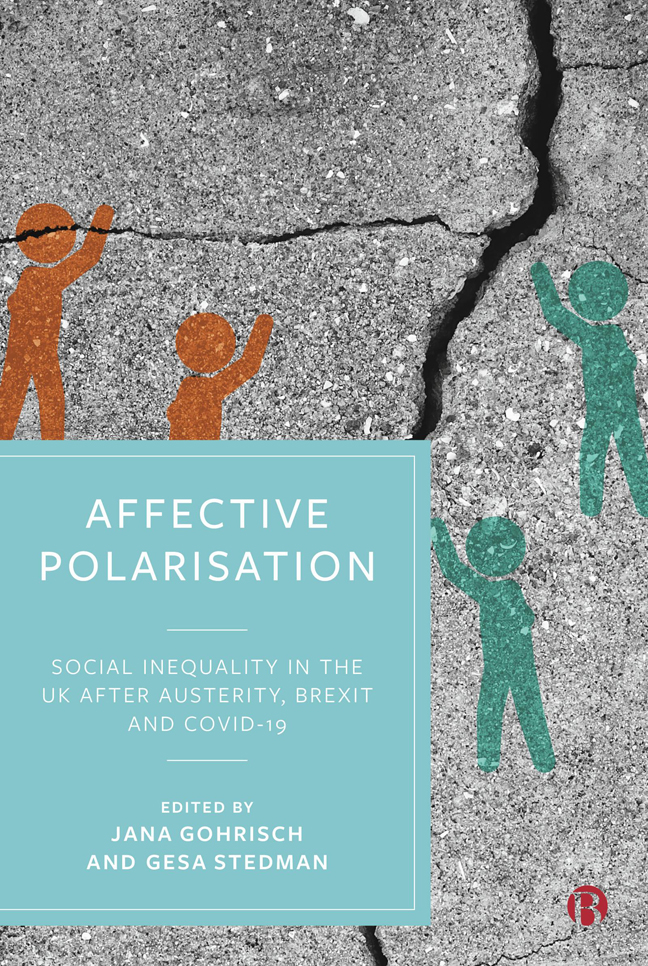Book contents
- Frontmatter
- Contents
- List of Figures, Tables and Boxes
- Notes on Contributors
- Acknowledgements
- Introduction
- 1 The Divided Left in the UK: Partisanship, Ideology and Class after Brexit
- 2 Populism and the People: Elitism, Authoritarianism and Libertarianism
- 3 ‘Coloring the Utterance with Some Kind of Perceivable Affect’: Constructing ‘Country’ and ‘People’ in Speeches by Theresa May and Boris Johnson – A Linguistic Perspective
- 4 The Challenges of Polarisation: Lessons for (Re-)Politicising Inequality across Four English Towns
- 5 “Go Away, But Don't Leave Us”: Affective Polarisation and the Precarisation of Romanian Essential Workers in the UK
- 6 Racialised Affective Polarisation in the UK
- 7 “Now You Have to Listen”: A Historical Analysis of Britain’s Left-Behind Communities
- 8 Britain in a State of Emergency: Studying Ken Loach's Films I, Daniel Blake (2016) and Sorry We Missed You (2019)
- 9 Cloaking Class: Making the Working Class Visible
- 10 Class, Poverty and Inequality in Scotland: Independence and the Creation of Affective Polarisations
- 11 Language and Identity: The Taliesin Tradition
- Conclusion
- Index
8 - Britain in a State of Emergency: Studying Ken Loach's Films I, Daniel Blake (2016) and Sorry We Missed You (2019)
Published online by Cambridge University Press: 23 January 2024
- Frontmatter
- Contents
- List of Figures, Tables and Boxes
- Notes on Contributors
- Acknowledgements
- Introduction
- 1 The Divided Left in the UK: Partisanship, Ideology and Class after Brexit
- 2 Populism and the People: Elitism, Authoritarianism and Libertarianism
- 3 ‘Coloring the Utterance with Some Kind of Perceivable Affect’: Constructing ‘Country’ and ‘People’ in Speeches by Theresa May and Boris Johnson – A Linguistic Perspective
- 4 The Challenges of Polarisation: Lessons for (Re-)Politicising Inequality across Four English Towns
- 5 “Go Away, But Don't Leave Us”: Affective Polarisation and the Precarisation of Romanian Essential Workers in the UK
- 6 Racialised Affective Polarisation in the UK
- 7 “Now You Have to Listen”: A Historical Analysis of Britain’s Left-Behind Communities
- 8 Britain in a State of Emergency: Studying Ken Loach's Films I, Daniel Blake (2016) and Sorry We Missed You (2019)
- 9 Cloaking Class: Making the Working Class Visible
- 10 Class, Poverty and Inequality in Scotland: Independence and the Creation of Affective Polarisations
- 11 Language and Identity: The Taliesin Tradition
- Conclusion
- Index
Summary
Introduction
The global spread of SARS-CoV-2 leading to the illness COVID-19 is a strong reminder of how pervasive and disastrous a virus can be – in medical terms and in terms of social, cultural, economic and political repercussions. The pandemic has exposed and exacerbated the shortcomings of the social security system in Great Britain, which was already under pressure after ten years of austerity politics. As social scientists point out, ‘[w] ave after wave of “welfare reform” and cuts to entitlement meant that the social security system entered the pandemic ill-equipped to provide effective support to families already in poverty and those pushed into it by COVID-19’ (Kaufman and Patrick, 2021). During the pandemic, the proportion of the population with some experience of claiming benefits rose considerably (see de Vries et al, 2021, p 7). In fact, Great Britain has ‘witnessed the fastest increase in the number of people claiming working-age social security benefits … since records began’ (Edmiston et al, 2020, p 2). Compared to pre-pandemic times, the cohort of COVID-19 benefit claimants is ‘atypical’ (Edmiston et al, 2020, pp 3, 18) in that new claimants are more likely to be younger, university graduates and owner-occupiers (Edmiston et al, 2020). In effect, COVID-19 has disrupted the labour market to such an extent that it brought about a ‘considerable change in the socio-economic profile’ (Edmiston et al, 2020, p 14) of benefit claimers.
Although not immediately concerned with the COVID-19 pandemic, the films I, Daniel Blake (2016), winner of the Palme d’Or at Cannes, and Sorry We Missed You (2019), by the long-standing collaborators director Ken Loach and scriptwriter Paul Laverty, are very topical, making for a viable case study to investigate divisions in contemporary Great Britain. Bearing in mind that social realist cinema is strongly interrelated with the societal and historical contexts from which it emerges, the films provide a ‘nuanced, troubling and provocative state-of-the-nation address’ (Johnston, 2019), as Trevor Johnston puts it in Sight & Sound. Creating vignette narratives of the everyday realities among the underprivileged in northern England, the films give screen time to those who feel left behind in austerity Britain (see Chapters 4 and 7, this volume).
- Type
- Chapter
- Information
- Affective PolarisationSocial Inequality in the UK after Austerity, Brexit and COVID-19, pp. 169 - 184Publisher: Bristol University PressPrint publication year: 2023

